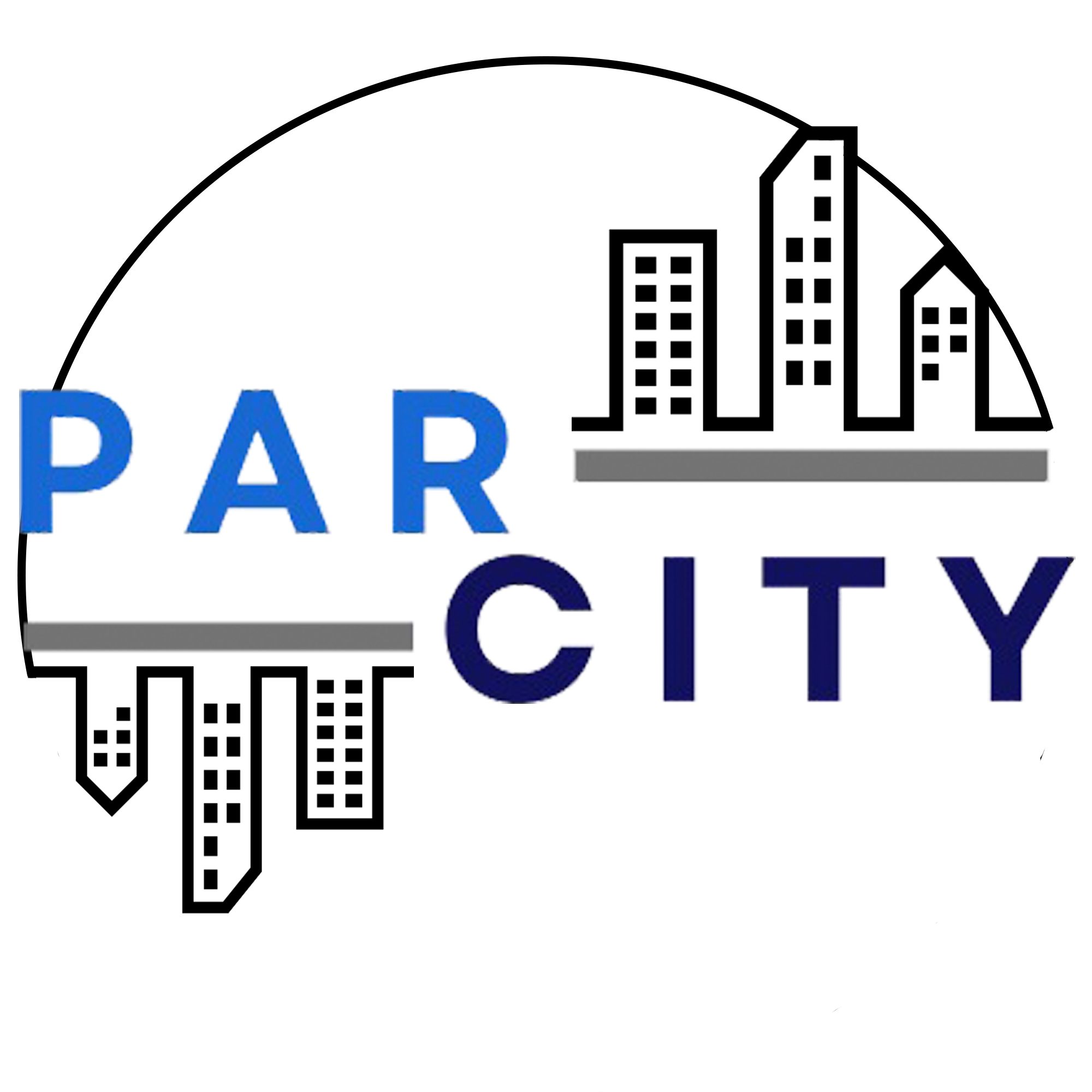news
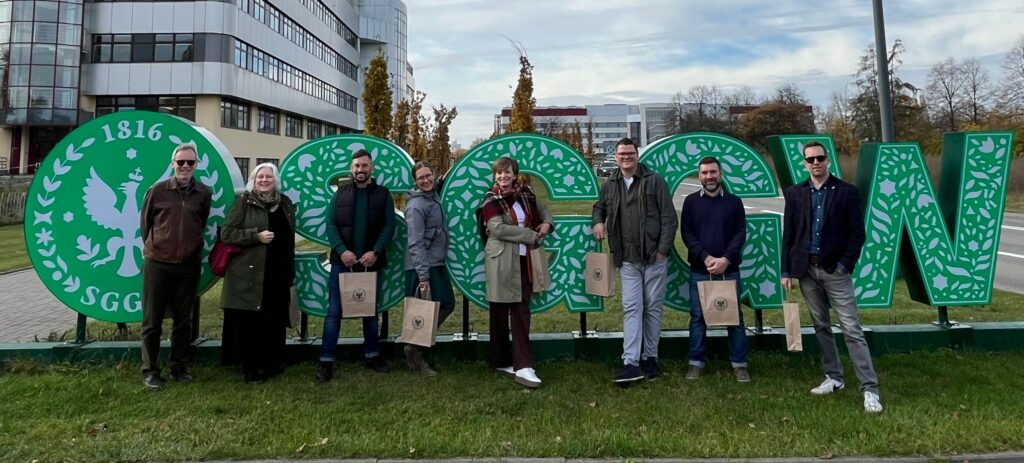 UPI 4 Workshop – DIGITALLY MEDIATED CONTENTIOUS POLITICS
UPI 4 Workshop – DIGITALLY MEDIATED CONTENTIOUS POLITICS
Warsaw, 29-30 october 2025 .-
Warsaw University of Life Sciences hosted workshops related to UPI 4. A group of researchers from Canada, the United Kingdom, Argentina and Poland analysed the relationship between city digitisation and civic participation. Do new technologies increase residents’ involvement? Do they intensify conflicts? Do they deepen citizens’ knowledge and improve communication between residents and city authorities? Researchers sought answers to these questions by comparing selected cases from Warsaw, Toronto, Calgary and Buenos Aires. The workshop was attended by: project leader Sam Halvorsen (Queen Mary University of London), Zachary Spicer (York University, Canada); Byron Miller (University of Calgary, Canada), Sebastian Mauro (University of Buenos Aires, Argentina) and the Polish team: Agnieszka Kampka (Warsaw University of Life Sciences), Ewa Modrzejewska (University of Warsaw), Kinga Wojtas-Jarentowska (Cardinal Stefan Wyszyński University) and Krystian Gajewski (Warsaw University of Life Sciences).
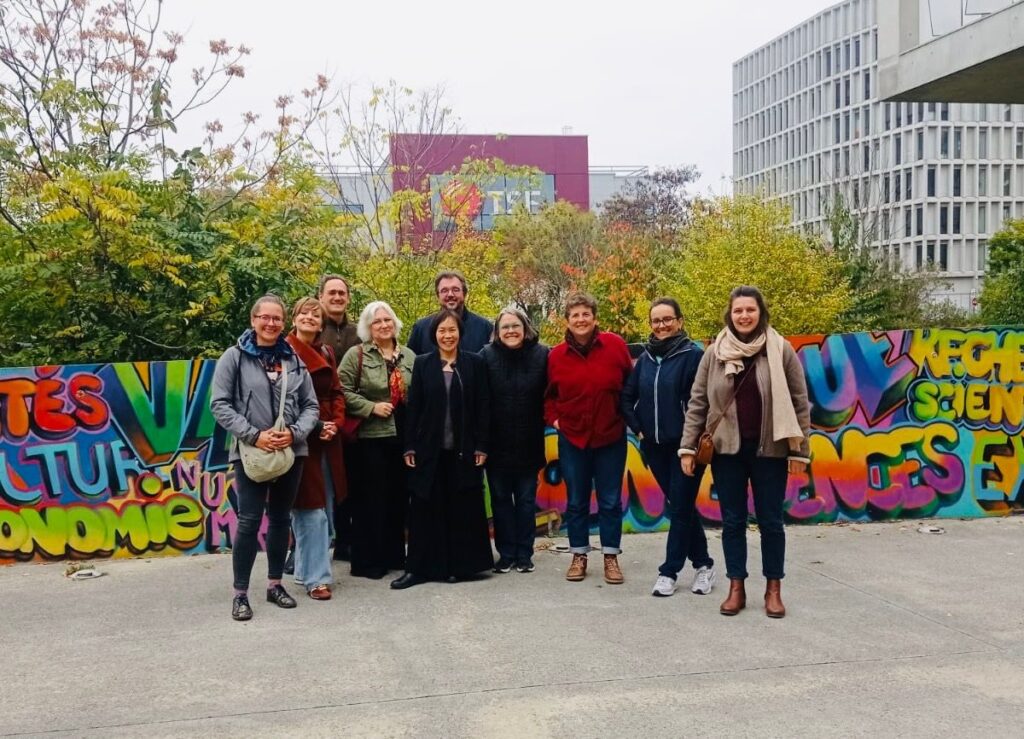 UPI 3 Workshop – Participatory Budgeting in Paris
UPI 3 Workshop – Participatory Budgeting in Paris
Paris, october 2025 .-
The PAR-CITY team working on Participatory Budgeting (UPI 3) met in Paris for a three-day workshop hosted by the Lyon team.
Researchers from São Paulo, Lyon, New York and Warsaw gathered to discuss how participatory budgeting is being implemented and reinterpreted across cities, with the Brazilian team joining remotely.
The discussions built on previous meetings to advance a comparative framework for analysing participatory budgeting as a democratic innovation. The group explored how local contexts shape the design and outcomes of these processes, from citizen involvement and project selection to questions of institutionalisation and impact.
The workshop provided a lively and collaborative setting to connect research findings, strengthen coordination across teams and outline future joint publications within the PAR-CITY project.
They had the opportunity to hear Celina Su, member of UPI 3, presenting her latest book, Budget Justice (Princeton University Press) during a public conference which was discussed by two Marion Lang (Par City, Lyon team) and Thomas Chevallier (UC Louvain).
Popular Neighbourhoods Workshop in Buenos Aires
Buenos Aires, 6 August 2025 .- A workshop titled Popular Neighbourhoods: Past, Present and Future was held at the Gino Germani Research Institute (University of Buenos Aires), bringing together local and international researchers working on urban inequality and socio-spatial transformation. The event was organised by Dr Mercedes Di Virgilio, who leads the Urban Studies Area at the Gino Germani Institute (IIGG-UBA), and is a long-standing contributor to urban studies on informal settlements and participatory upgrading.
The meeting brought together members of the IIGG and the PAR-CITY project to share ongoing work and explore intersections in research agendas. The teams presented their work, followed by an open discussion on conceptual and methodological challenges in studying neighbourhood upgrading processes.
Participants included Valeria Snitcofsky and Mercedes Najman from the IIGG, as well as Eliana Persky and James Clacherty from the PAR-CITY team. James, a visiting researcher from Cape Town. Dr Sam Halvorsen, PAR-CITY’s lead PI, also took part in the exchange during his field visit to Buenos Aires.
The workshop formed part of the UPI 2 line of the PAR-CITY project, which explores participatory neighbourhood upgrading in Buenos Aires, São Paulo, Cape Town and Eastern Europe.
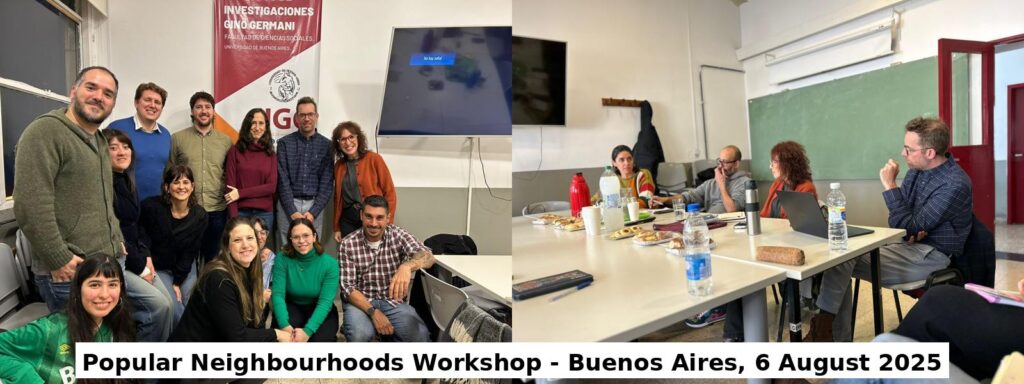
PAR-CITY at IPSA 2025: Panel on Participation in the 21st Century City

The panel titled “Participation in the 21st Century City” brought together comparative urban research on participatory democracy from across the network.
- Gisele Craveiro (Universidade de São Paulo) presented a collaborative paper co-authored with Gabriela de Brelaz, Alina Ribeiro, Rocío Annunziata, and Zac Spicer, analysing attempts at co-creating Open Government plans in Buenos Aires, São Paulo, and Toronto.
- Celina Su (City University of New York) and Ben Goldfrank (Seton Hall University) shared their research on participatory budgeting and participation ecosystems in New York City, with comparative insights from Warsaw, Lyon, São Paulo, and Buenos Aires.
The session was a timely contribution to global debates on democratic innovation and civic engagement in contemporary urban contexts.

UPI 1: Open government
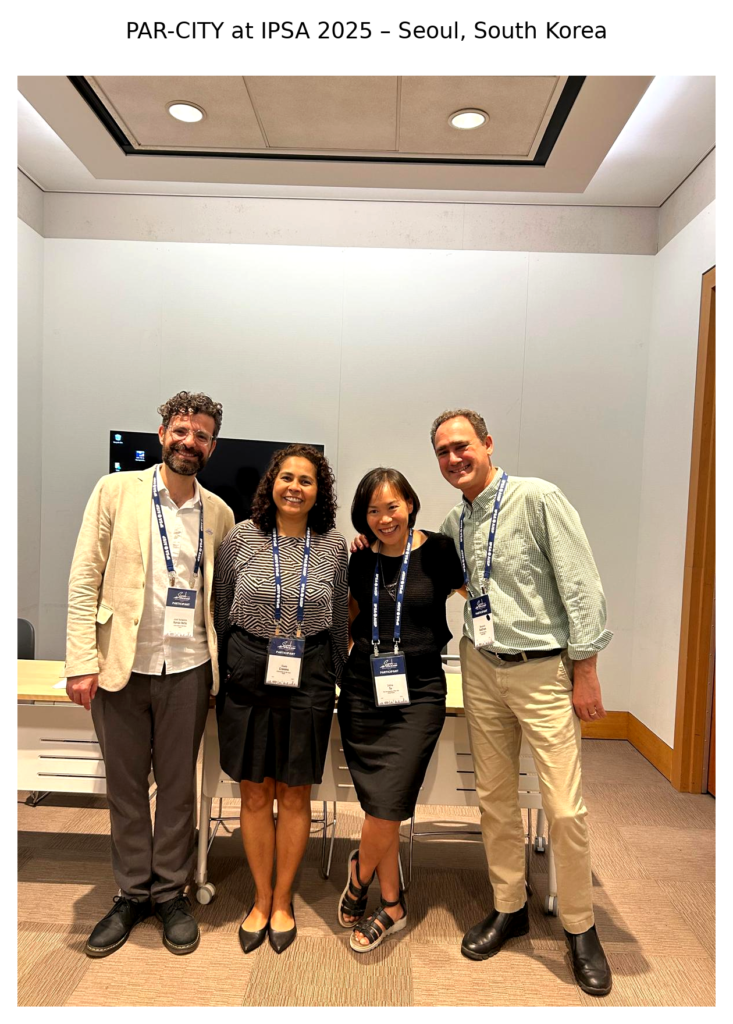
UPI 1 team joins São Paulo’s Open Government initiative
📍 São Paulo, 24 June 2025.- We are pleased to share that members of the PAR-CITY team working on UPI 1: Open Government are actively contributing to São Paulo’s 4th Open Government Action Plan.
Gabriela de Brelàz (Unifesp and NDAC/Cebrap), Alina Ribeiro (USP and NDAC/Cebrap), and José Veríssimo (USP and NDAC/Cebrap) are representing Cebrap in the Fórum de Gestão Compartilhada (FGC) — a collaborative space that brings together civil society and local government to co-create, implement, and monitor commitments on open government. The FGC includes key municipal departments and civil society organisations that are democratically selected to ensure inclusive participation.
The process is coordinated by the City of São Paulo’s Open Government Unit, part of the Mayor’s Office, which promotes transparency, accountability, civic engagement, and innovation. The first meeting of the new FGC cycle took place on 24 June 2025 at the Mário de Andrade Library and marked the launch of the co-creation process for the city’s 4th Open Government Plan.
This collaboration is a meaningful example of how our UPI research intersects with ongoing urban democratic innovations.
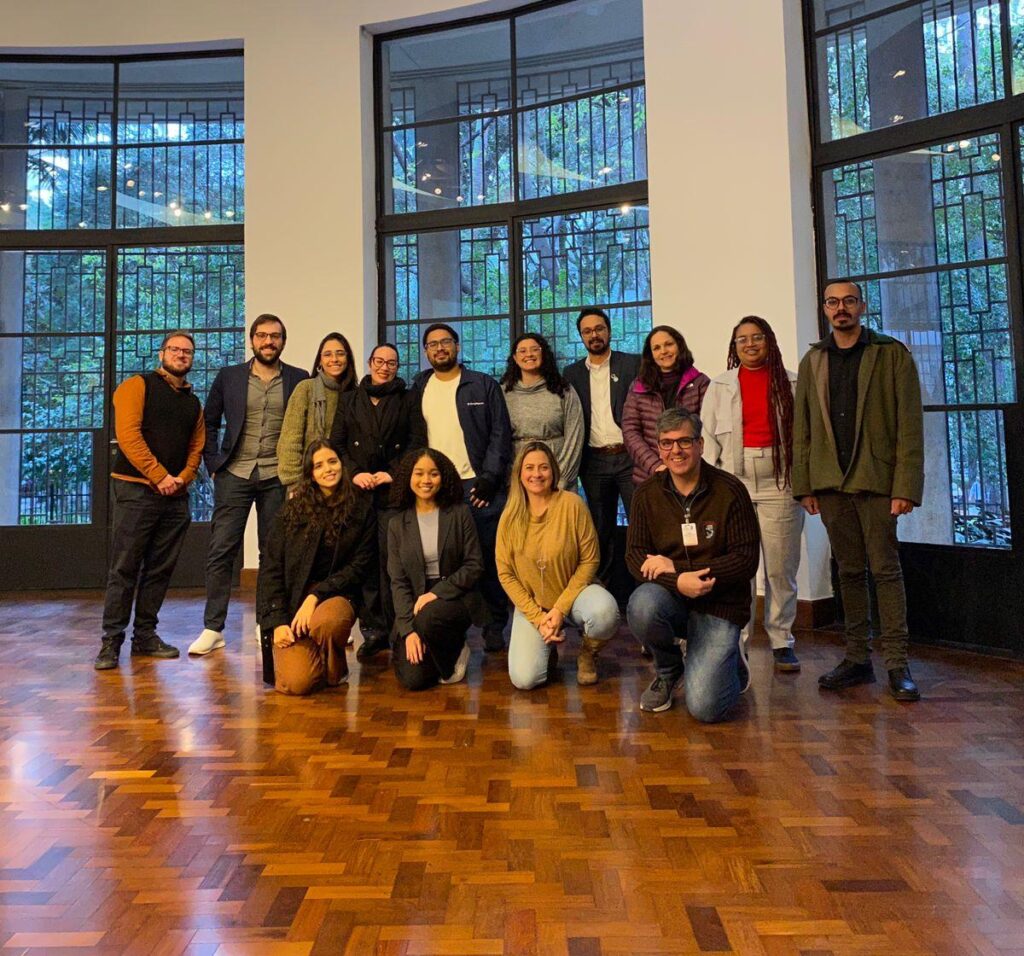
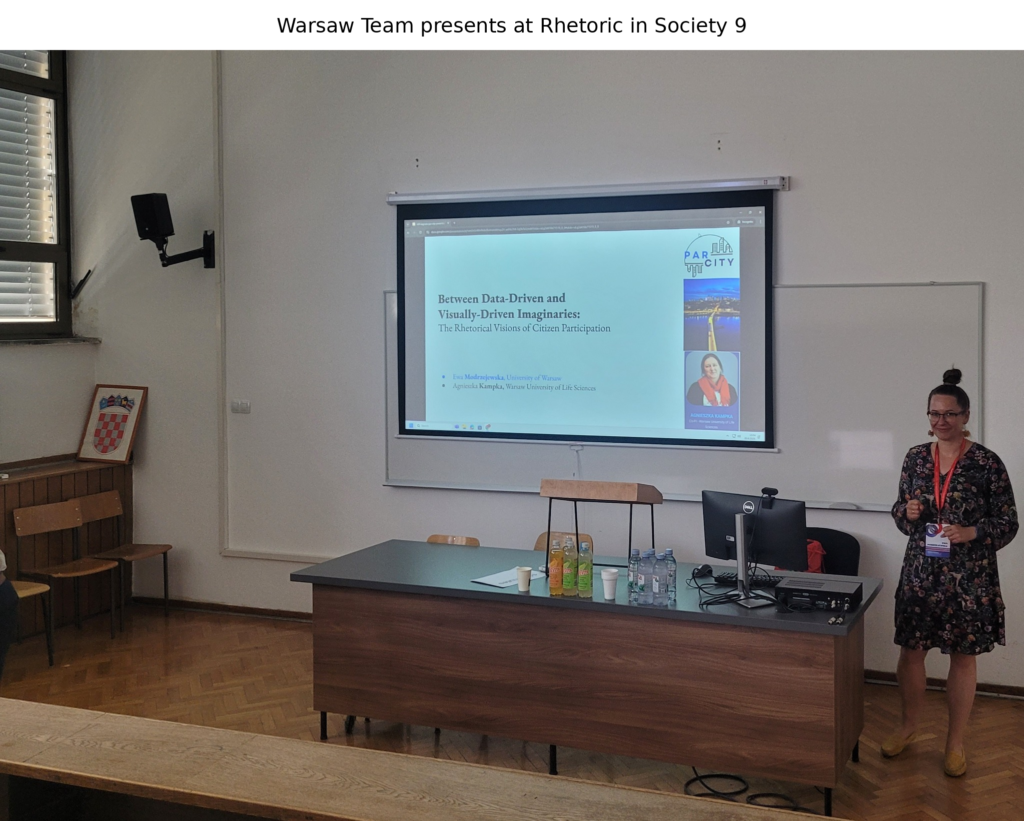
Warsaw Team Presents at Major Rhetoric Conference in Zagreb
📍 Zagreb, Croatia – In June 2025, Dr. Ewa Modrzejewska (University of Warsaw) presented joint research with Dr. Agnieszka Kampka (Warsaw University of Life Sciences) at Rhetoric in Society 9: Rhetoric in the Digital Age, a leading European academic conference held at the University of Zagreb.
Their paper, “Between Data-Driven and Visually-Driven Imaginaries: The Rhetorical Visions of Citizen Participation”, examined how the Warsaw Municipal Office promotes participation in the #Warsaw2040+ strategic planning process through visual and digital narratives.
📸 The images capture Dr. Modrzejewska’s presentation and the engaged audience. The session highlighted the growing importance of rhetorical strategies in shaping civic engagement and urban futures.
This biannual conference brings together scholars from across Europe and beyond to reflect on the evolving dynamics of public discourse in the digital age.
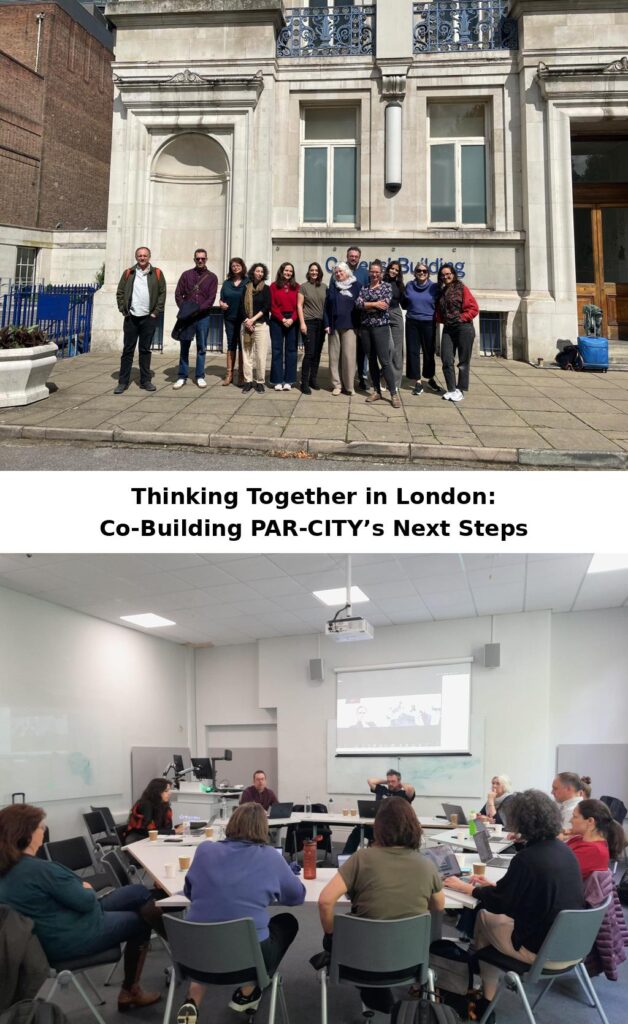
From 3 to 6 June 2025, the PAR-CITY team gathered at Queen Mary University of London for a vibrant four-day workshop. Hosted in the Queen’s Building at the Mile End campus, the event brought together project members from across the globe to deepen our theoretical and empirical collaborations.
The first two days were dedicated to meetings among co-PIs, where we revisited the project’s core aims, shared updates, and advanced the collective book proposal. The Theory axis led the hybrid monthly meeting on Wednesday afternoon, initiating a thoughtful discussion on the concept of Urban Participatory Innovations (UPIs).
On Thursday and Friday, we held parallel workshops for the Theory and Participatory Budgeting (PB) groups. The Theory team focused on conceptual development and collective writing, while the PB stream worked on structuring case comparisons, discussing available data, and drafting analytical tools for joint analysis.
The week closed with a joint session that brought together both streams for a rich exchange of ideas and plans for future collaboration.

PAR-CITY at IRSPM 2025 in Bologna: Co-PIs Share Emerging Research
April 2025 –From 7 to 9 April 2025, the city of Bologna hosted the IRSPM Annual Conference, where two PAR-CITY Co-Principal Investigators presented research aligned with our project’s core themes of democracy, trust, and participatory innovation.
🟡 Digital Participation and Crisis Prevention: Analysing the Citizenship Budget in Warsaw
Agnieszka Kampka, in collaboration with Ewa Modrzejewska, shared insights on the potential of digital tools to enhance citizen engagement and resilience. Their paper examined the Citizenship Budget in Warsaw, raising critical questions about digital participation’s role in crisis prevention. The presentation featured in the thematic session Strengthening prevention and increasing resilience of service users, communities and public services through digital participatory approaches.
🟡 Co-Creation in Open Government Plans: A Comparative Study between Buenos Aires, São Paulo and Toronto
Gabriela de Brelàz presented findings from the PAR-CITY Urban Participatory Innovation (UPI) on Open Government. Her research examines how co-created Open Government action plans are developed in Buenos Aires, São Paulo and Toronto, and how these processes engage civil society and use digital tools. The work is part of an ongoing collaboration within PAR-CITY with Rocío Annunziata, Alina Ribeiro and Zachary Spicer.
🔗 Read more about the IRSPM 2025 Conference

Par-city host first in person workshop at queen mary university of london
December 2024 – From 2 to 6 December 2024, the PAR-CITY project held its first in-person workshop at Queen Mary University of London (QMUL). This week-long event brought together members of the research team from across the globe to advance the project’s work on urban participatory innovations and their relationship with democracy, governance, and trust.
Participants included Dr. Sam Halvorsen (QMUL), Dr. Cristina Temenos (University of Manchester), Dr. Ross Beveridge (University of Glasgow), Dr. Anna Selmeczi (University of Cape Town), Dr. Agnieszka Kampka (Warsaw University of Life Sciences), Dr. Fiona Anciano (University of the Western Cape), Dr. Camila Saraiva (Federal University of ABC), Arq. Barry Lewis (University of Cape Town), and Mg. Eliana Persky (UBA-UNSAM).
The workshop served as a vital platform for collaborative research and writing, featuring sessions dedicated to the project’s core themes. Key moments included:
City Case Study Presentations: Researchers provided updates on the four cities under study, exploring how participatory practices intersect with neighbourhood upgrading and climate crisis responses.
Theory Axis Workshop: Participants engaged in discussions on theoretical frameworks underpinning the project, followed by concept development and collective writing.
Paper Development: Time was devoted to drafting a collaborative paper on neighbourhood upgrading, setting the foundation for future publications.
We look forward to sharing more updates as the project progresses.
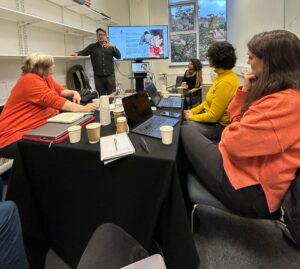
New Research from PAR-CITY Lead PI Sam Halvorsen: Rethinking Participation in Slum Upgrading
November 2024 -PAR-CITY is pleased to highlight a significant new publication from our Lead Principal Investigator, Dr. Sam Halvorsen, titled Slum upgrading and participation: Insights from a marginalised neighbourhood in Buenos Aires. Published in Habitat International (Open Access), this paper offers fresh perspectives on the relationship between participation and urban transformation in informal settlements.
Drawing from qualitative research conducted in Barrio Saldías, a small informal settlement in Buenos Aires, Dr. Halvorsen challenges conventional understandings of slum upgrading as either “top-down” or “bottom-up.” Instead, he proposes a relational and strategic approach that considers the complex interplay between residents, party brokers, and local state representatives. This approach foregrounds participation as a shared political logic driven by a collective desire to transform urban space.
Key contributions of the paper include:
Moving beyond the binary of top-down vs. bottom-up upgrading processes.
Highlighting the role of political intermediaries and state actors working alongside residents in participatory upgrading.
Situating participatory upgrading within a broader political trajectory in Buenos Aires, beyond project-specific interventions.
The study analyses three key moments of participatory upgrading in Barrio Saldías, offering critical insights into the ways participation can exceed clientelist interpretations and operate as a dynamic force for urban change.
This paper aligns closely with PAR-CITY’s broader focus on urban participatory innovations and their implications for democracy, governance, and trust. It serves as a valuable resource for scholars, policymakers, and practitioners interested in participatory urban development.
The full article is available open access: https://doi.org/10.1016/j.habitatint.2024.103196.
Stay tuned for more updates on PAR-CITY’s ongoing research and future publications.
press release
PAR-CITY: Global Research Project Explores How Urban Participatory Innovations are Reshaping Democracy, Governance and Trust
September 2024 — A new international research initiative, PAR-CITY, is set to investigate how cities around the world are addressing key challenges related to democracy, governance, and trust through urban participatory innovations (UPIs). These innovations range from grassroots movements that utilise urban spaces—both physical and digital—to foster trust and reinvigorate democracy, as well as institutional reforms such as open government initiatives and participatory designs for decision-making processes. The project will focus on how UPIs are transforming the way citizens engage with democratic institutions in large urban areas.
Led by Dr Sam Halvorsen from Queen Mary, University of London, PAR-CITY brings together 25 researchers from 21 universities across seven major cities: Buenos Aires, Cape Town, Lyon, New York, São Paulo, Toronto, and Warsaw. 6 Co-PI with different academic backgrounds will conduct the project in each country.
“Cities are laboratories for democratic renewal, offering new ways for citizens to engage and shape their political environment,” said Dr Halvorsen. “This project aims to uncover how these urban spaces are responding to global challenges through innovative participatory practices.”
PAR-CITY has secured prestigious funding from the Trans-Atlantic Platform (T-AP) call on Democracy, Governance and Trust, being one of 18 selected projects; its true strength lies in its international collaboration. The project, which will run for three years, has received approximately US$1.4 million in funding from research agencies across seven countries, including ANR, FAPESP, NCN, NRF, NSF, and UKRI.
At the conclusion of the project, the team will produce a co-authored book, multiple journal articles, and a digital platform to disseminate their findings globally.
